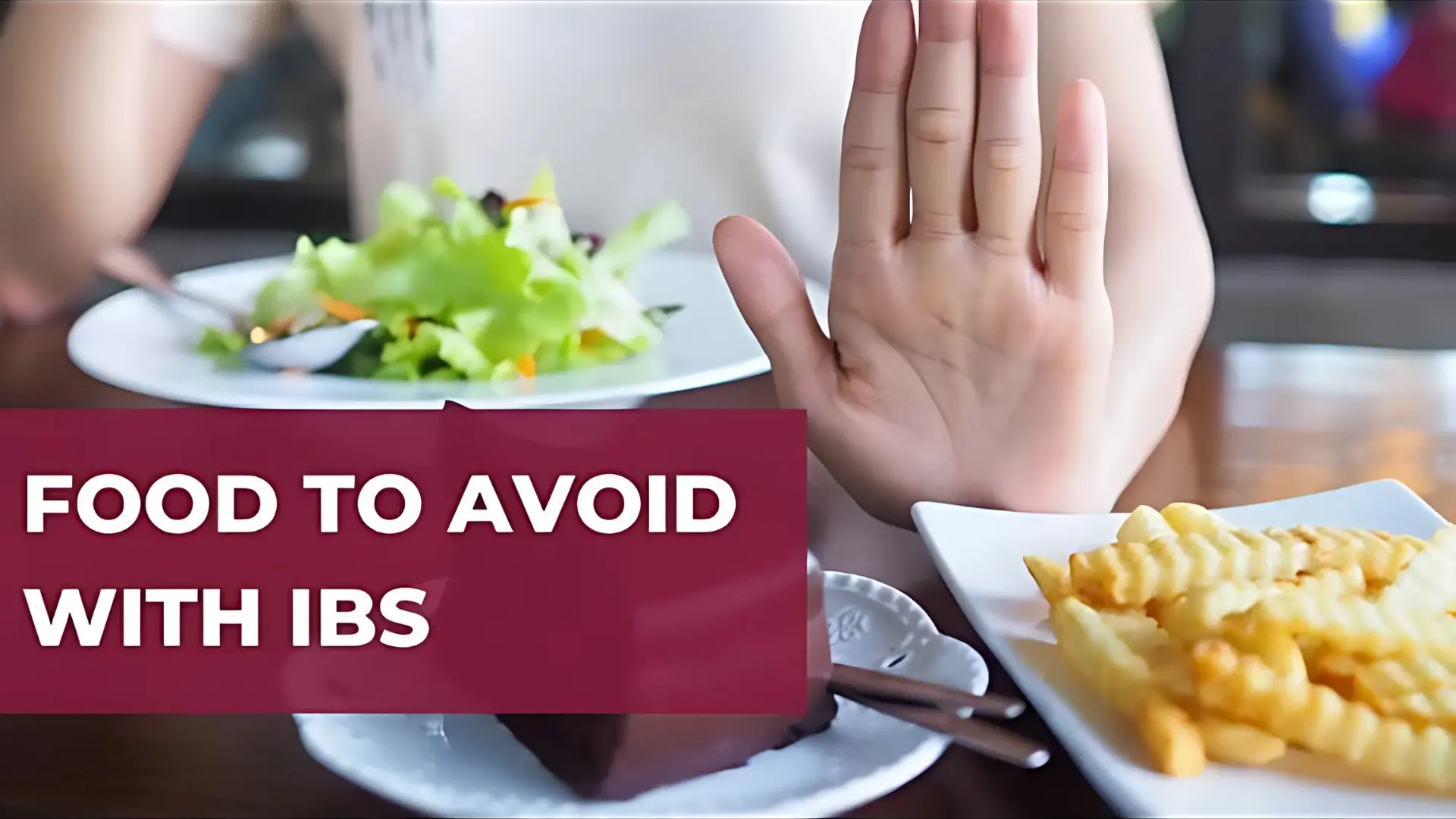
Everything You Need to Know About IBS Symptoms and Diet Changes
December 18, 2024
IBS commonly known as Irritable Bowel Syndrome is a gastrointestinal disorder that affects the large intestine. IBS symptoms are majorly twice as common among women than men. Commonly mistaken for inflammatory bowel disease (IBD), this condition can harm people of any age.
Identified by a range of symptoms, IBS is not a life-threatening condition. However, it can have a significant impact on our everyday life. It causes a series of symptoms that come and go, often triggered by stress, certain foods, or lifestyle factors.
Due to different lifestyle habits, IBS management can be challenging as its symptoms vary widely among individuals. However, understanding its origin and avoiding certain foods can help those with IBS live more comfortably.
Understanding IBS – What it is and Who Gets it?
IBS is a chronic gastrointestinal condition that can cause diarrhea, constipation, or sometimes both. To understand it, there’s no structural or biochemical abnormality in the digestive tract, but it affects the way the bowel functions.
Research shows that IBS is caused by a combination of factors. Those with IBS will experience hypersensitivity in the gut and muscle contractions in the intestines. These disruptions can lead to changes in bowel movements, pain, and bloating.
In one of the studies conducted in 2018, healthcare professionals found that IBS symptoms occurred at least 3 days per month causing intestinal damage in some cases. IBS is often diagnosed between the ages of 20 and 40, with women twice as likely as men.
Common Symptoms of IBS
IBS symptoms and treatment results differently in individuals. With a range of symptoms that can vary widely in severity and frequency, IBS symptoms fall into the following categories:
Abdominal Pain and Cramping
Abdominal pain is one of the most common and distressing symptoms of IBS. This pain often causes cramping and discomfort that tends to occur in the lower abdomen. Unlike regular stomach aches, IBS-related pain is typically relieved after a bowel movement or flatulence. This pain can be recurring and highly intense during flare-ups.
Bloating and Gas
Another symptom of irritable bowel syndrome is feeling bloated. Several people with IBS also experience an uncomfortable fullness or swelling in the abdomen, often coupled with excess gas. This bloating can be unpredictable and can get worse with certain food intake.
Diarrhea and Constipation
Types of IBS are commonly classified into subtypes based on the primary bowel symptoms:
- IBS-D (Diarrhea-predominant): Characterized by frequent, loose stools.
- IBS-C (Constipation-predominant): Marked by infrequent, hard stools that are difficult to pass.
- IBS-M (Mixed): Alternating between diarrhea and constipation.
There is often an unpredictable pattern of bowel movements among people with IBS. It can also affect a person’s quality of life, causing anxiety, depression, and social isolation. IBS treatments usually involve lifestyle changes, medications, and even psychotherapy in some cases.
Changes in Stool
IBS often causes changes in stool urgency and frequency. People will notice clear or white mucus in stool with different colors & consistencies, often appearing lumpy or thin. This is a clear sign of inflammation or irritation in the bowel, one of the most common symptoms of IBS.
Nausea and Fatigue
Many people with IBS feel nauseated after eating, even after eating a small portion of a meal. Anxiety, societal pressure, and the physical toll of dealing with digestive symptoms can result in fatigue and disrupted sleep.
IBS Symptoms Foods to Avoid

While IBS symptoms vary from one person to another, certain foods are known to aggravate symptoms in many individuals. Here are some common worst foods for IBS to avoid.
High-FODMAP Foods: A Key Group to Limit
FODMAPs are short-chain carbohydrates that the small intestine absorbs poorly. When these carbohydrates reach the large intestine, they ferment and create gas. High-FODMAP foods include:
- Fruits: Apples, pears, mangoes, cherries, and watermelon.
- Vegetables: Cauliflower, broccoli, onions, garlic, and mushrooms.
- Dairy Products: Cheese, milk, ice cream, and curd.
- Legumes and Pulses: Beans, lentils, and chickpeas.
- Sweeteners: Sorbitol, mannitol, and xylitol.
Follow a low-FODMAP diet to reduce IBS symptoms in many people. This approach involves eliminating high-FODMAP foods, and then gradually reintroducing them to identify specific triggers.
Dairy Products: Watch Out for Lactose
Lactose intolerance is common in those with IBS; especially in women. One of the major reasons for IBS symptoms in females is lactose intolerance. As lactose can be difficult to digest and may lead to bloating. Common sources of lactose include:
- Milk and cream
- Cheese (ricotta and cottage cheese)
- Ice cream and frozen desserts
- Any dairy products
Consider lactose-free dairy products or plant-based alternatives like almond, soy, or coconut milk to help reduce symptoms.
Gluten-Containing Foods: Potential IBS Triggers
Although IBS is not caused by gluten intolerance or celiac disease, many people with IBS find that gluten worsens their symptoms. Gluten is a protein found in wheat, barley, and rye. Try to avoid foods including:
- Bread, pasta, and baked goods
- Cereals
- Crackers and snack foods
For those with gluten sensitivity, gluten-free alternatives made from rice, oats, or quinoa can offer relief without compromising on taste.
Caffeinated Beverages: An Unsettling Stimulant
Caffeine is widely known to stimulate the gut. It can increase motility in the intestines causing problems for people with IBS. People with diarrhea-predominant IBS should avoid caffeine products such as:
- Coffee and tea
- Energy drinks
- Soft drinks
- Artificial juice
Try decaffeinated versions of these drinks or caffeine-free alternatives such as herbal tea to reduce the risk of IBS flare-ups.
Artificial Sweeteners: Small Ingredients with Big Effects
Sugar substitutes like sorbitol, mannitol, and xylitol can be hard for the gut to digest, leading to bloating, gas, and diarrhea. These sweeteners are often found in:
- Sugar-free gum and candy
- Diet sodas
- Low-calorie or processed foods
Check for these ingredients & artificial sweeteners and avoid these products to minimize unbearable IBS symptoms.
High-Fat Foods: Hard to Digest and Often Triggering
Fat-rich food is often hard to digest and can trigger stomach pain. High-fat foods can slow down digestion leading to bloating, constipation, and diarrhea. Watch out for fat-containing foods such as:
- Fried foods (vegan & non-veg)
- Fatty cuts of meat, like bacon or sausage
- Heavy sauces and dressings
Choose grilled or baked options and incorporate more lean proteins to get a more gut-friendly approach.
Spicy Foods
Spicy foods are the perfect recipe for IBS flare-ups. Spices like chili and cayenne pepper, can irritate the lining of the digestive tract and speed up bowel movements. For those with IBS, this can mean more frequent or urgent trips to the bathroom.
Alcohol
Alcohol is a very known irritant to the digestive tract and can exacerbate IBS symptoms. Beer, wine, and other spirits when consumed in larger quantities can cause bloating, gas, and extreme discomfort. To reduce these symptoms, consider limiting alcohol consumption and staying well-hydrated.
Diet Tips for Managing IBS and Lifestyle Changes
Eat Smaller, More Frequent Meals
Large meals can pressurize the digestive system to digest faster. This can cause cramping and bloating. Maintain habits to eat smaller and more frequent meals to help.
Stay Hydrated
Drink as much water as you can every day. Staying hydrated helps with digestion and eases constipation symptoms.
Incorporate Fiber in Your Diet
Soluble fiber often found in oats, psyllium, and some fruits can help manage IBS symptoms. However, high-fiber foods like raw vegetables and whole grains can aggravate symptoms in some people, so it’s important to take advice from a professional before incorporating it into your everyday diet.
Limit Heavy Digesting Foods
Foods like beans, lentils, carbonated drinks, and certain vegetables including cabbage and Brussels sprouts can increase gas and bloating. If you’re eating foods like chicken, fish, turkey, or tofu on an everyday basis be sure to do enough physical workouts to digest them easily.
Manage Stress
Stress is an extremely common trigger for IBS symptoms. Practice mindfulness, meditation, exercise, and get adequate sleep to help you manage stress levels.
Consider Probiotics
According to studies, probiotics can help balance gut bacteria, which may ease IBS symptoms. Make sure to consult a healthcare professional to determine which strains may be beneficial for you.
Conclusion
Irritable bowel syndrome is a complex condition with unique symptoms in each individual. With careful attention to diet and routine changes, you can make a world of difference.
Avoid common IBS trigger foods and make lifestyle changes. You can also consider irritable bowel syndrome medications to improve your quality of life. Be sure to consult with a healthcare provider or dietitian personalized management plan that meets your specific needs.
FAQs
What is IBS, and what causes it?
Irritable Bowel Syndrome or IBS is a digestive disorder that affects the large intestine. Its exact cause is changes in gut bacteria with additional factors such as abnormal gut motility, stress, and sensitivity to certain foods.
Are there different types of IBS?
IBS is categorized based on the predominant bowel symptom IBS is categorized in majorly three types:
- IBS-D (Diarrhea-predominant): Frequent, loose stools.
- IBS-C (Constipation-predominant): Infrequent, hard stools.
- IBS-M (Mixed): Alternating between diarrhea and constipation.
Why is IBS more common in women than in men?
According to studies, IBS is more common in women. It can be possible due to hormonal fluctuations. As estrogen and progesterone levels can impact gut motility and sensitivity, making women more prone to IBS symptoms, particularly around menstrual cycles.
How to cure IBS permanently?
Currently, there is no permanent cure for IBS, as it is a chronic condition. However, symptoms can be effectively managed and significantly reduced with the right approach. This includes dietary changes like following a low-FODMAP diet, avoiding trigger foods, managing stress through mindfulness and exercise, staying hydrated, and possibly using medications or probiotics under medical guidance.
What are the common symptoms of IBS attack?
An IBS attack often involves abdominal pain, bloating, gas, and bowel changes like diarrhea or constipation. Symptoms of IBS in females may be more severe due to hormonal shifts, especially during menstrual cycles, leading to increased bloating, cramping, and digestive discomfort. Urgency, mucus in stool, nausea, and fatigue are common.
Why does my stomach hurt when I eat?
Stomach pain after eating can be caused by several factors, including Irritable Bowel Syndrome (IBS), food intolerances (like lactose or gluten), overeating, or eating too quickly. IBS in particular can trigger cramping, bloating, or discomfort after meals—especially if the food contains high-FODMAP ingredients, caffeine, or heavy fats.
